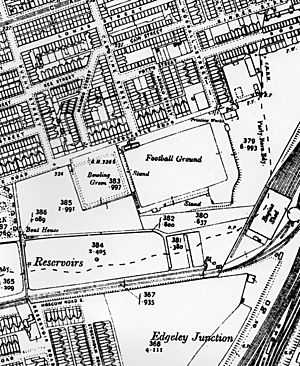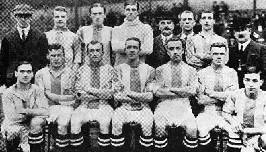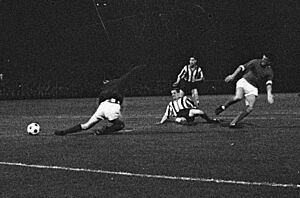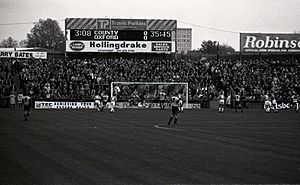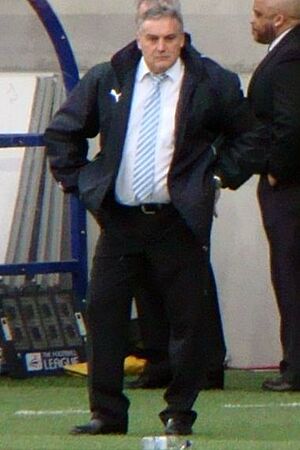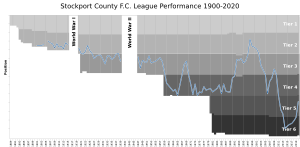History of Stockport County F.C. facts for kids
Stockport County F.C. is a football club from Stockport, Greater Manchester, England. The club started in 1883 as Heaton Norris Rovers. They changed their name to Stockport County in 1890. This was after the area became known as the County Borough of Stockport.
The team's nickname is "The Hatters." This comes from Stockport's history as a big hat-making town. Stockport County has played their home games at Edgeley Park since 1902.
Stockport first joined the Football League in 1900. They played in the Football League for 106 years without a break until 2011. They mostly played in the lower divisions. The team won their first league title in 1922. This was in the new Third Division North. They won two more league titles in 1937 and 1967.
The 1990s were the club's most successful time. Stockport played in the First Division for five seasons. They also reached the League Cup semi-finals in 1997. During this time, County played at Wembley Stadium four times. They played in two Football League Trophy finals and two play-off finals. However, they lost all four matches.
After facing money problems in the early 2000s, the club moved down the leagues. They left the Football League in 2011. They were then relegated to the sixth tier of English football in 2013. Stockport became more stable in the years that followed. They won promotion back to the fifth tier in 2019. In 2022, County won the National League. This meant they returned to the EFL after 11 years away. In 2023, they returned to Wembley for the 2023 EFL League Two play-off final.
Contents
Early Football League Years (1883–1930)
Stockport County was formed in Heaton Norris in 1883. It started at McLaughlin's Cafe. A group of students from Stockport Sunday School created the team. They were also part of the Wycliffe Congregational Church. Heaton Norris Rovers played their first game in October 1884. It was a friendly match at home against Stalybridge. They lost the game 3–0.
The club got the nickname "The Hatters." This was because Stockport was famous for making hats. This nickname is also used by Luton Town. Heaton Norris Rovers changed their name to Stockport County in 1890. This happened after the area became the County Borough of Stockport.
The team played home games in different parks for several years. In 1889, Heaton Norris Rovers moved to Green Lane. This is seen as the team's first official home ground. The team played in the Lancashire League and local cup games. In 1900, they joined the Football League Second Division.
In 1894, Stockport reached the first round of the FA Cup for the first time. They were the first club from the Lancashire Combination to do this. They lost 1–0 at home to Burton Wanderers. Fred Stewart became Stockport's first manager. He had been involved with the club since it started in 1883. Stockport's first Football League match was a 2–2 draw against Leicester Fosse.
In 1901, Arthur Wharton signed for Stockport. He was the first black professional footballer. He was 36 years old and played six games before retiring in 1902. Stockport left Green Lane in 1902. They moved to their current home, Edgeley Park. At that time, Stockport RFC also played there.
Stockport finished in the bottom three for their first four seasons. The team thought about rejoining the Lancashire Combination in 1902 due to money problems. At the end of the 1903–04 season, they were not re-elected to the Football League. They spent one year in the Lancashire Combination, which they won. After that season, they were voted back into the Football League.
In their first season back (1904–05), Stockport wanted a top team. They spent money on players and a professional trainer. They finished the league in 10th place. In 1908, Stockport County became a 'limited liability company'. This meant it was owned by shareholders.
Stockport stayed in the Second Division for seven years. In the 1912–13 season, they had to be re-elected again. Stockport got enough votes and kept their Football League status.
During this time, Stockport used friendly matches to find new players. David Ashworth became the team's first manager in 1914. When World War I started, normal football was stopped. Stockport played in the Lancashire section of the Wartime Football League. This was from 1915 to 1919. The FA Cup was also stopped.
Many clubs lost their best players to the war. Stockport was lucky to keep many players from the previous season. Stockport's best finish during the war was second place in 1916–17. Ashworth managed the team throughout the war. He left at the end of 1919 to join Liverpool.
The 1920–21 season was not good for Stockport. They finished last in the Second Division. But instead of facing re-election, Stockport was placed in the new Third Division North. They started the next season very well. They won five of their first six matches. They were unbeaten from January to March 1922.
Stockport won their first Football League title in 1922. They beat Darlington in front of 18,500 fans at Edgeley Park. The manager, Albert Williams, received the trophy a week later.
Back in the Second Division, Stockport looked for top players. The team struggled but avoided relegation by just one point. The next season (1923–24), Ernest Barlow became the club chairman. He stayed in this role for 30 years. Stockport's goalkeeper, Harry Hardy, was called to play for the England national team. He did not let in any goals in a 4–0 win against Belgium. He is the only player to play for England while at Stockport. Hardy also played 150 games in a row for Stockport. Stockport County finished 13th that season.
Stockport returned to the Third Division North in 1926. They finished last in the Second Division in 1925–26. The team finished sixth the next season. But they lost two points and got a fine. This was because they played a player, Joe Smith, who was not properly registered.
The team finished the 1920s in the Third Division North. In the 1927–28 season, the club finished third. Joe Smith was Stockport's top goalscorer. He scored 38 goals out of Stockport's 89. He famously scored five goals in a 6-3 home win against Southport.
Stockport then finished second in two seasons in a row. In the 1928–29 season, they got 62 points. They scored over 100 goals. For the first time, they had an average of 10,000 fans per game. They won nine of their last eleven matches. But it was not enough to win the league. Stockport also finished second the next season (1929–30). They were four points behind the champions Port Vale. This was despite beating Port Vale 2–1 away on Christmas Day and 4–2 on Boxing Day 1929. Frank Newton was Stockport's top goalscorer. He scored 36 goals out of Stockport's 106. Newton also scored five goals in one match against Nelson. This equalled a club record.
Mid-Century Challenges (1930–1950)
From the 1930s, Stockport County wore white and black home kits. They were nicknamed the 'Lilywhites'. In the 1933–34 season, they scored 115 goals. This included a huge 13–0 home win over Halifax Town. In that game, Joe Hill scored three goals and Percy Downes scored four. During the season, Alf Lythgoe scored a club-record 46 goals for Stockport. Stockport's 2–1 home defeat to Crystal Palace in the FA Cup was shown on TV. Stockport finished third that season.
On 23 July 1935, the wooden main stand at Edgeley Park burned down. This happened just three weeks before the season started. The fire also damaged nearby houses. The fire destroyed the club's records up to 1935. The current Main Stand was built in 1936. It was officially opened by Charles Sutcliffe, the president of the Football League.
In the 1936–37 season, Stockport won the Third Division North. They got 60 points and 23 wins. They had a ten-game unbeaten run. This included seven wins. The title was decided on the last day against Lincoln City. Over 27,000 fans watched the game. The next season (1937–38), they finished last in the Second Division. They were relegated back to the Third Division North. They only got 31 points.
In the 1939–40 season, Stockport played only two matches before war was declared. The Football League was then stopped. It did not start again until after World War II. Regional league competitions were set up instead. The FA Cup was replaced with the Football League War Cup. In the first war league (1940–41), Stockport finished 35th in the Northern Regional League. Harry Catterick played 122 guest games for Stockport during the war. He scored 98 goals.
In the 1945–46 season, there was no English league football. Regional games still happened. But the FA Cup started again. Stockport was knocked out of the 1945–46 FA Cup in the first round. They lost 3–2 on total score to Rochdale.
Also in 1945–46, Stockport played Doncaster Rovers in a cup match. This game is said to be the longest professional football match ever. It lasted 203 minutes! The first game had ended 2–2, so a replay was needed. There were no rules for extra time, so the game had to continue until someone scored. But no one scored, except for one goal that was not allowed. The game was stopped because it got too dark. Stockport then lost the second replay 4–0. In the first league season after the war (1946–47), Stockport finished fourth in the Third Division North. They had 24 wins and 50 points.
Modern Era and Comeback (1950–Present)
The 1950s did not bring much league success. But they were famous for the goal-scoring of Jack Connor. He scored 140 goals in five seasons. This is still a club record. He scored 13 hat-tricks (three goals in one game). Three of these were in a row! He also scored four goals twice and five goals twice.
In 1951, Alec Herd played alongside his son David. This was in a 2–0 win against Hartlepool United. They were the first father and son to play on the same pitch in a professional match. In 1958, the regional Third Divisions were combined into national Third and Fourth Divisions. Stockport finished high enough to be placed in the national Third Division. They spent one season there before being relegated.
Stockport played in the first League Cup in 1960–61. They beat Carlisle United in the first round. But they lost 3–0 to Manchester City in the second round. They also did well in the FA Cup. They beat First Division team Luton Town 3–0. But they lost 3–2 away to West Ham United in the fourth round.
In the 1964–65 FA Cup, Stockport played against the champions Liverpool at Anfield. Stockport was last in the Fourth Division at the time. But they got an unexpected 1–1 draw. Len White scored their goal. They lost the replay 2–0. By the end of the 1964–65 season, the club finished last in the Fourth Division. They only had 27 points. But they were re-elected to the league.
In the 1964–65 season, Stockport chairman Vic Bernard brought back the royal blue kit. He also hired Bert Trautmann as general manager. Trautmann was a former Manchester City goalkeeper and FA Cup winner. Trautmann and Bernard decided to play matches on Friday evenings. This was to try and get more money. Trautmann's German connections helped arrange a friendly game with FSV Frankfurt. Stockport lost 3–1. The next pre-season, Stockport toured Germany. They played three friendly games in five days. Trautmann left his job in 1966. A friendly game with SV Hamburg in May 1966 ended in a 5–1 defeat. Len White scored Stockport's only goal. Two seasons later, Stockport returned to the Third Division. They won the Fourth Division in 1966–67. They got 64 points.
After the club was relegated in 1970, the 1970s and 1980s were difficult times. The team often struggled against relegation. In October 1972, Stockport knocked West Ham United out of the League Cup. Goalkeeper Alan Ogley made a great save that was voted Stockport's 'Save of the century' in 2002. Stockport lost in the next round to Norwich City.
George Best played three home games for Stockport in 1975. He scored two goals. In February 1984, Stockport played in the Associate Members' Cup. Stockport's chairman, Dragan Lukic, helped create this competition. The match against Crewe Alexandra ended 2–2 after extra time. It was decided by Stockport's first penalty shoot-out. They lost 3–0.
Eric Webster managed Stockport five times. Four of these were as a temporary manager in the 1980s. He first joined in 1974 to work with the youth team. Webster signed Micky Quinn from Wigan Athletic. After 16 years at the club, Webster had a special match against Manchester City in 1990.
In 1986–87, automatic promotion and relegation started between the Football League and the Conference. Stockport faced leaving the Football League. They had only six points from 13 games. But Colin Murphy came in as manager for his second time. Stockport got 45 points from their last 31 games and survived. Murphy left soon after the season ended.
Danny Bergara became manager in March 1989. Stockport won automatic promotion in 1990–91. In the 1992 Football League Trophy Final, Bergara became the first South American to lead an English team at Wembley. Bergara led Stockport to Wembley three more times. Once in the Football League Trophy and twice in the play-offs. They lost all four times.
The club was told to improve their behaviour. They had the worst disciplinary record in the country in 1992–93. In 1994, they lost 2–1 to Burnley in the Play-Off final at Wembley. They finished the match with nine players. Michael Wallace was sent off for spitting. Chris Beaumont, who scored one of Stockport's goals, was also sent off.
In March 1995, Bergara was sacked after an argument with the chairman. Dave Jones became manager in April.
A new all-seater stand, the Cheadle End, opened in 1995. It could hold over 5,000 fans. In an otherwise quiet season, the club reached the third round of the FA Cup. They played against the holders Everton at Goodison Park. Stockport drew the match 2–2. But they lost the replay 3–2 ten days later.
The 1996–97 season was the most successful in the club's history. They finished second in the Second Division. They also reached the semi-final of the League Cup. They knocked out three Premiership teams. They lost to Middlesbrough 2–1 over two games. Stockport lost the first game 2–0 at Edgeley Park. But they won the second game 1–0 with a goal from Sean Connelly.
Before the 1997–98 season, Dave Jones left for Southampton. Gary Megson left Blackpool to become manager. In his first season, Stockport finished eighth. This was only two places from the play-offs. It was the club's best ever league finish.
However, the next season (1998–99) Stockport finished 16th. They won only three of their last fourteen matches. A 5–0 defeat at Oxford United on the final day ended Megson's time at Edgeley Park. The club promoted from within. Andy Kilner, who was coaching at the club, became first team manager. His time started with a 2–1 win over Manchester City. On Boxing Day, the club was sixth and in a play-off spot.
Challenges and Relegation (2000–2011)
After their win over Manchester City, the team went a club-record 19 games without a victory. They finished the 1999–2000 season 17th. They won two of their last three matches to avoid relegation. The 2001–02 season was the club's worst ever at the time. Stockport was already last in the league. A 4–0 home defeat to Millwall led to manager Kilner being sacked.
Former England international Carlton Palmer was appointed in November 2001. But he could not save Stockport from relegation to Division Two in 2001–02. Palmer could not build a team to challenge for a return to Division One the next season.
In summer 2003, the club's ownership changed. The owner, Elwood, sold the club to Sale Sharks owner Brian Kennedy. This meant Sale would play their home games at Edgeley Park. A new company, Cheshire Sport, was created. It owned Stockport County, Sale Sharks, and the Edgeley Park stadium.
After a bad start to the 2003–04 season, Palmer was sacked. John Hollins, who was director of football, became temporary manager. Then former Northern Ireland manager Sammy McIlroy was appointed. Poor results led to his sacking. Chris Turner was appointed a year later. Another relegation followed. Stockport now played in League Two. This was one level above the Conference. Turner resigned after one year. This was after a 6–0 defeat to local rivals Macclesfield Town. County was five points from safety and facing a third relegation in four years.
In 2005, after losing a lot of money, Cheshire Sports chairman Brian Kennedy gave ownership of the club to the Stockport County Supporters Trust. This group wanted to save the club from financial trouble. They aimed to make the club stable and community-based.
Former player Jim Gannon was put in charge. He was first a temporary manager. He led the club to safety in 2005–06. He then led a promotion challenge the next season. They missed out on the League Two play-offs by goal difference.
The next season (2007–08), Stockport County continued their success. They lost an FA Cup replay to non-League Staines Town on penalties. At the end of the season, Stockport had a small chance of automatic promotion. But they missed out, finishing fourth. However, they beat Wycombe Wanderers 2–1 in the play-off semi-final. Stockport then played Rochdale at Wembley in the final. They came from behind to win 3–2 and earned promotion to League One.
During the 2008–09 season, Stockport was in the League One play-off spots at Christmas. But their form dropped in the final months. They had only two wins in their last ten games. This saw them fall to mid-table. Gannon was asked to become manager of Brighton & Hove Albion. Stockport agreed to this. But Gannon turned down the job and stayed at Stockport. Due to Stockport's money problems, Sale Sharks paid for Stockport's policing bill for a home match.
Four days later, Stockport County went into administration. This meant they had serious financial trouble. On 12 June 2009, the club's administrator announced a deal had been made. A group of businessmen called the Melrose Consortium wanted to buy the club. Three months later, the administrators agreed to a plan with previous shareholders and creditors. Gary Ablett, a former Liverpool and Everton defender, was appointed Stockport manager. In December 2009, the team's training ground was put up for sale. The Melrose Consortium never took over the club. Their bid was rejected by the Football League. A month later, a new group, the '2015 Group', was given the chance to take over the club.
The '2015 Group' of investors bought Stockport County. The Football League approved this in May 2010. The takeover was announced on 17 June 2010. After the takeover, Ablett was dismissed. This was after one of the club's worst seasons. They got 25 points from 46 matches and were last in League One for most of the season.
Starting the 2010–11 season in League Two, the new owners promised to "rebuild the club." They appointed former Carlisle United boss Paul Simpson as manager. He was sacked after only six months. Peter Ward became temporary manager. Ray Mathias was brought in as assistant. This lasted two months. In March 2011, Mathias replaced Ward as temporary manager. Stockport's results improved under Mathias. But they were still relegated to the Conference. This was the first time in their history they left the Football League, after 106 years.
Non-League Era (2011–2022)
After being relegated to the Conference National, Mathias was made permanent manager. But before the pre-season started, he was dismissed. A businessman tried to buy the club but failed. He replaced Mathias with former German international Dietmar Hamann. Hamann had no previous managerial experience. He won three of nineteen matches before resigning. This was after a fans meeting in November 2011. The meeting called for Gannon, who had been watching matches as a fan, to be re-appointed. Eight days later, Gannon became director of football. Gannon improved performances. He steered Stockport away from the Football Conference relegation zone. They finished 16th.
The club got full use of their Edgeley Park stadium again in 2012. This was after Sale Sharks moved to another ground. On 15 January 2013, 30-year-old Ryan McKnight became the new chief executive officer. He was the youngest in UK football. Gannon was then sacked for a second time. He was replaced by Swiss manager Darije Kalezić. He had never managed in English football before. He was dismissed after only two months. This was because results got much worse. The club faced relegation to the Conference North. Kalezić was replaced by Ian Bogie. But he could not stop the team from being relegated on the final day of the season.
The club announced it would no longer be a full-time club. It would become a part-time team. The start to life in the Conference North was bad. Bogie resigned in August 2013. The club was second from bottom of the league. Alan Lord, a former assistant manager, was appointed manager. McKnight announced he would resign in April 2014. Lord managed a mid-table finish in the 2013–14 season. He stepped down before the end of the 2014–15 season.
In February 2015, the Stockport County board shared a plan for the club's future. It was called the 'Moving Forward' Document. It focused on four main points: stability, sustainability, stadium, and success.
In summer 2015, Stockport started their third season in the National League North. Neil Young became Stockport's new permanent manager. He had been successful in the same division with Chester. Young left in January 2016 after failing to lead a strong promotion challenge. The club again turned to Gannon. He returned for a third time as manager.
Gannon led the club to a ninth-place finish in 2015–16. They also won the Cheshire Senior Cup. Gannon rebuilt his team. They finished near the play-off places for the next two seasons. In 2017, a search was done to find the families of the club's founders.
After almost getting promoted in the previous season, 2018–19 was a better season. After a slow start, Stockport reached the second round of the FA Cup. They lost 1-0 away against Barnet. Stockport also reached the FA Trophy semi-finals for the first time. They lost 3–2 on total score to AFC Fylde. The first game was 0–0. The second game was 3–2 to Fylde. Stockport ended the season by winning their first league title in 52 years. This meant promotion back to the National League. A parade was held a few weeks later. Also in 2018, Stockport honoured 13 former players who died in World War I. Former player and Royal Air Force veteran George Haigh, then 103, unveiled a plaque outside the ground.
Local businessman Mark Stott bought County in January 2020. He made the club debt-free. Stott promised to make the club full-time again. He also wanted to help them climb back up the Football League. And he wanted to find a new training ground. Managed by Dave Challinor (appointed in November 2021), County won the National League in 2021–22. This secured their promotion back to the EFL after 11 years away.
Return to the Football League
In their first season back in League Two, Stockport had a difficult start. But they then had a great run. They finished 4th in the league. They reached the 2023 EFL League Two play-off final after beating Salford City in the semi-final. However, they lost to Carlisle United 5–4 on penalties after a 1–1 draw at Wembley.
 | Delilah Pierce |
 | Gordon Parks |
 | Augusta Savage |
 | Charles Ethan Porter |


